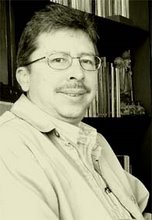Friday, May 18, 2007
By Harold Segura
By Harold Segura
Ever since I arrived in Aparecida I knew I was going to have troubles with the weather. I was expecting heat, but it was cold. My first outing around the small city was in order to get warm clothes, but fortunately I didn’t find any… which was better because it was very hot the next day. The weather changes very frequently and this surprises us. A priest friend (who is Colombian like me) told me this morning that the week before the Pope came, temperature had gone from 10º C (50º F) in the morning to 34º C (93º F) at noon. That can make the strongest person sick. And that’s what has happened. The sessions this morning took place among sneezes and the uneasiness of colds.
But there are also other changes that, even if sharp, are certainly very positive. There was a change in the pace of the meetings, and we moved from the speeches (which are only speeches, no matter how important) to working group sessions. The first theme unit was named “The Current Times” and has to do with an analysis of the reality of our Continent. The methodology agreed is well-known for Latin American theology and pastoral work—first “seeing”, then “judging”, and finally “acting.” So we started by “seeing” what is going on in the Region and its implications for discipleship and mission.
To begin, a bishop presents a short position paper which is followed by two responses. With this initial input, we divide into groups of fifteen to twenty people. Fifteen groups were formed in total. Mine, for example, is number seven. Each group appoints a redactor in charge of writing a synthesis of the contributions. With this synthesis, the group then meets two other groups and the three of them develop an integrated synthesis. The session rules call this method “the grid working system.” The syntheses developed yesterday were presented today. Almost all groups gave an overview of the social, cultural and ecclesial reality. They mentioned globalization, poverty, the crisis of institutions, ecological aggression, disappointment with democratic systems, inequality, drug traffic, corruption and other issues that give a good description of our landscape. After receiving the outcome of group work, the session is opened for participation by those bishops who want to take part. These interventions need to have been previously requested to the Presidency and are submitted in writing. This ensures order and the quality of the interventions.
Today we listened to eleven interventions that pointed out gaps in the work of groups. The interventions asked for more specific mentions of the Indian world, the environment, drug traffic, inter-cultural and inter-faith dialogue, the family, seniors and children. The now usual allusion to “Protestant proselytism” could not be absent—a reference that should not upset us if, in the end, we come to fraternal agreements (we hope the term “Protestant sects” will not be used any more, and will be replaced by “church communities” or “Christian communities”) so that we can work together in overcoming the most pressing evils. In the face of such blatant denials of life, we all need to join efforts. Inhuman poverty, for instance, has no favoritisms—it’s everyone’s problem, and we all can fight it together. The evils of the world are like a cold, that makes no distinction of beliefs.
Harold



No hay comentarios:
Publicar un comentario